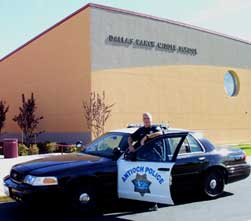 The start of a new high school football season is a reason to celebrate–but it also is a time for administrators to be on guard against those who find the games an excuse for criminal behavior. And it’s not just football that can lead to security problems on campus. The same can be true for dances, concerts, and other after-school activities. Fortunately, there are some steps that can help control a situation before it gets out of hand…
The start of a new high school football season is a reason to celebrate–but it also is a time for administrators to be on guard against those who find the games an excuse for criminal behavior. And it’s not just football that can lead to security problems on campus. The same can be true for dances, concerts, and other after-school activities. Fortunately, there are some steps that can help control a situation before it gets out of hand…
For many students, faculty, parents, and members of the surrounding community, the start of a new high school football season is a reason to celebrate. But it also is a time for administrators to be on guard against a few people who find the games an excuse for criminal behavior.
And it’s not just football that can lead to security problems on campus. The same can be true for dances, concerts, and other afterschool activities. Fortunately, there are some steps that can help control a situation before it gets out of hand.
Create a plan that provides security for the entire campus. Don’t overlook little-used or remote areas that provide an ideal place for rapes, fights, drug deals, or other criminal behavior. Extra lighting can discourage people from using these areas as hiding places or staging areas for crime.
Security personnel or screened volunteers need to regularly patrol the entire campus before, during, and immediately after an event. Be sure to work closely with local law enforcement and request extra officers be made available at the event and for patrolling the parking lots and immediate area surrounding the campus. Also check for individuals loitering and suspicious vehicles.
Fencing can limit the number of entries to a stadium. Open only one door for entry into a gymnasium. Have security personnel view students as they enter and remove those who are obviously under the influence of alcohol or drugs. Also, once students leave an event, they should not be allowed to return. Trained personnel can use metal detectors–both hand-held wands and walk-through devices–to check students for weapons as they enter an event.
Indoor and outdoor security cameras should focus on the parking lots, the stadium and gymnasium entries and perimeters, and the ticket office and snack bar. During events, make sure school personnel, law enforcement, or a professional security company is monitoring the video. And if there is a crime committed on campus, recorded video can help identify suspects and prosecute offenders.
There are no guarantees that administrators can stop all crime related to after-school events, but these are a few steps that can reduce the chances of serious problems. Let’s do our best to help the students to safely enjoy some of the more fun parts of their high school experience.
 Patrick Fiel is public safety advisor for ADT Security Services and a former executive director of school security for Washington, D.C. Public School System. He also served 22 years in the Army Military Police Corps, where his responsibilities included day-to-day security operations at the West Point Military Academy. During his time with ADT, Fiel has conducted more than 100 television, radio, newspaper, and magazine interviews as a public and school safety expert.
Patrick Fiel is public safety advisor for ADT Security Services and a former executive director of school security for Washington, D.C. Public School System. He also served 22 years in the Army Military Police Corps, where his responsibilities included day-to-day security operations at the West Point Military Academy. During his time with ADT, Fiel has conducted more than 100 television, radio, newspaper, and magazine interviews as a public and school safety expert.
Follow Patrick Fiel on Twitter.
- Friday 5: Teacher stress - May 3, 2024
- Student success is impacted by issues outside of school, survey finds - May 1, 2024
- Friday 5: Virtual field trips - April 26, 2024

